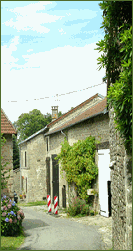|
Yet with the decline of the Roman Empire, Alsace
became the territory of the Alemanni. The Alemanni were agricultural people, and their
language formed the basis of the modern-day Alsatian dialect.
Then during the 5th century the Franks drove the Alemanni out of Alsace and Alsace became
part of the Kingdom of Austrasia.
Alsace remained under Frankish control until the Frankish realm was, following the Oaths
of Strasbourg of 842, formally dissolved in 843 at the Treaty of Verdun.
During the 12th and 13th centuries Alsace experienced great prosperity under the
Hohenstaufen Emperors, but this prosperity was terminated in the 14th century by a series
of harsh winters, bad harvests, and the Black Death.
In time, after being part of the Kingdom of Burgundy during
the 15th century, Alsace became part of the Holy Roman Empire as western part of the duchy
of Swabia and was later under the administration of the Austrian House of Habsburg.
During the Renaissance, prosperity returned to Alsace under Habsburg administration, until
the Thirty Years War, which devastated large parts of southern Germany. Most of Alsace was
ceded to France at the Peace of Westphalia in 1648, which, along with Lorraine, marked its start as a contested territory between
Germany and France.
The City of Strasbourg was annexed by France during the reign of Louis XIV of France, in a
time when Habsburg and other Germans were fighting off the Turks, at the Battle of Vienna.
Alsace remained a part of Germany until the end of World War I, when Germany ceded it
under the Treaty of Versailles.
After World War I, the establishment of German identity in Alsace was reversed, as Germans
who had settled in Alsace since 1871 were expelled. Policies forbidding the use of German
were introduced.
The region was effectively annexed by Nazi Germany in 1940 during World War II and
reincorporated into the Greater German Reich, but the German government never negotiated
or declared a formal annexation.
France regained control of the war-torn area in 1944 in order to preserve the possibility
of an agreement with the West and the resumed its policy of promoting the French
language. For example, from 1945 through to 1984 the use of German in newspapers was
restricted to a maximum of 25%.
|
|


